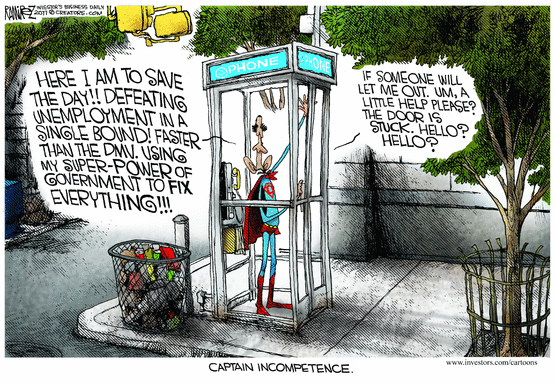A historian would probably have a field day highlighting the examples of incompetence and immorality in the American roster of Presidents.

They’re men after all, some better than others, and many succumbed to a frailty of character. And the source of that weakness? I’d nominate pride and its many iterations.
On that point, one of the themes to our current President’s most recent State of the Union address is a teachable example of incompetence and immorality. In particular, I’m talking about his vision of investment as related to a Democrat, big government agenda. He knows not what he speaks and the impact on the American common good may very well be catastrophic and immoral.
For a time in my life, I was a principal in a firm that advised some of the largest pension funds in America on matters related to investment, policy, administration and so on. How large? Our pension fund clients had assets of $750 billion (yes, a B) and as a fiduciary, we were obligated to handle our clients’ affairs with trust, honesty and good faith. It should also be emphasized, we labored for our clients’ best interests and not our own. And we were accountable.
Day after day, investment managers would come in and make their pitch to us. More on that in a moment. The ultimate objective of the Blackstones, Morgan Stanleys, and Goldman Sachs of the world was to make a compelling case for their investment thesis and set the wheels in motion to ultimately be allocated monies in the range of $50 million to $1 billion plus. So we’d listen.
And after a while you got pretty good at identifying the best candidates for investment. It hinged primarily on three factors.
- Investment strategy
- Team
- Track record
Is the investment strategy the most compelling in a particular niche and asset class? Is there a team in place that could successfully execute the strategy? Is there a quantifiable track record for that team which demonstrates their competency?
In essence, these three questions determined the winners and the losers as to the initial outlay. Then they had to go out and perform. Most of the time, I said no.
Which brings me to President Obama and his team. Are they handling the nation’s economic health with trust, honesty and good faith and shelving their own interests? Let’s take a look.
Currently, government investment is the spending of tax revenues and borrowed money. The areas mentioned in the speech as targets of spending were infrastructure, education, clean energy, science, manufacturing, etc. You can’t argue that these sectors shouldn’t attract dollars but should that money be public or private? Private, in my view, and it would help immensely if the bloated, inefficient, regulatory-crazed government got out-of-the-way.
You see, President Obama and his government do not have the expertise to pick a compelling investment strategy among many. The government does not have an administrative infrastructure in place to oversee and successfully execute multiple strategies. Lastly, Obama et al. do not have a whisper of a track record in any of these areas. Why, in heaven’s name, do they think they can pick winners and losers. It’s delusional and incompetent to think you can.
Furthermore, that the President wants to undertake such ill-advised pursuits with borrowed money is wrong and immoral under a strict definition. He is, in effect, gambling with other people’s money and he’s clueless about the game. Some will argue that government borrowing is not a bad thing but I’ve never been convinced of that. The United States will shortly be $17 trillion in debt–the greatest debtor nation in history. Is this debt good or bad? I believe it’s bad and puts the welfare of the American citizenry at risk for multiple generations.
An interesting experiment in legacy building would be to observe the actions of a polarizing President who begins to do the right thing for ALL his constituents (even though some wouldn’t like it). His self-interest would be “back burnered” and stop being a distracting element. His mission would be for the protection and promotion of the common good and every executive action would embody that. Is such a person only a fictional character?
And what exactly is the common good? Catholic teaching states that it is “the sum total of social conditions which allow people, either as groups or as individuals, to reach their fulfillment more fully and easily.”
It consists of three essential elements: (a) it presupposes respect for the fundamental rights of the human person and the natural freedoms necessary for the development of the human vocation; (b) it requires the social well-being and development of the group itself, i.e., whatever is needed to lead a truly human life such as food, clothing, health, work, education, and culture should be accessible to each one; (c) it requires peace, i.e., the stability and security of a just order. These social conditions are obtained through social justice.
These social conditions however, are jeopardized when government policies deny fundamental rights (such as life), damage or constrain the society’s well-being (debt and regulation), and compromise peace and security (military defense cuts).
President Obama. We know you care about your legacy, your opportunity to influence American history and your ranking among Presidents. I would suggest you forget about Rushmore and worry more about the people you were elected to serve. Your legacy can wait. Between you and me however, you’re on track for a horrific one.
